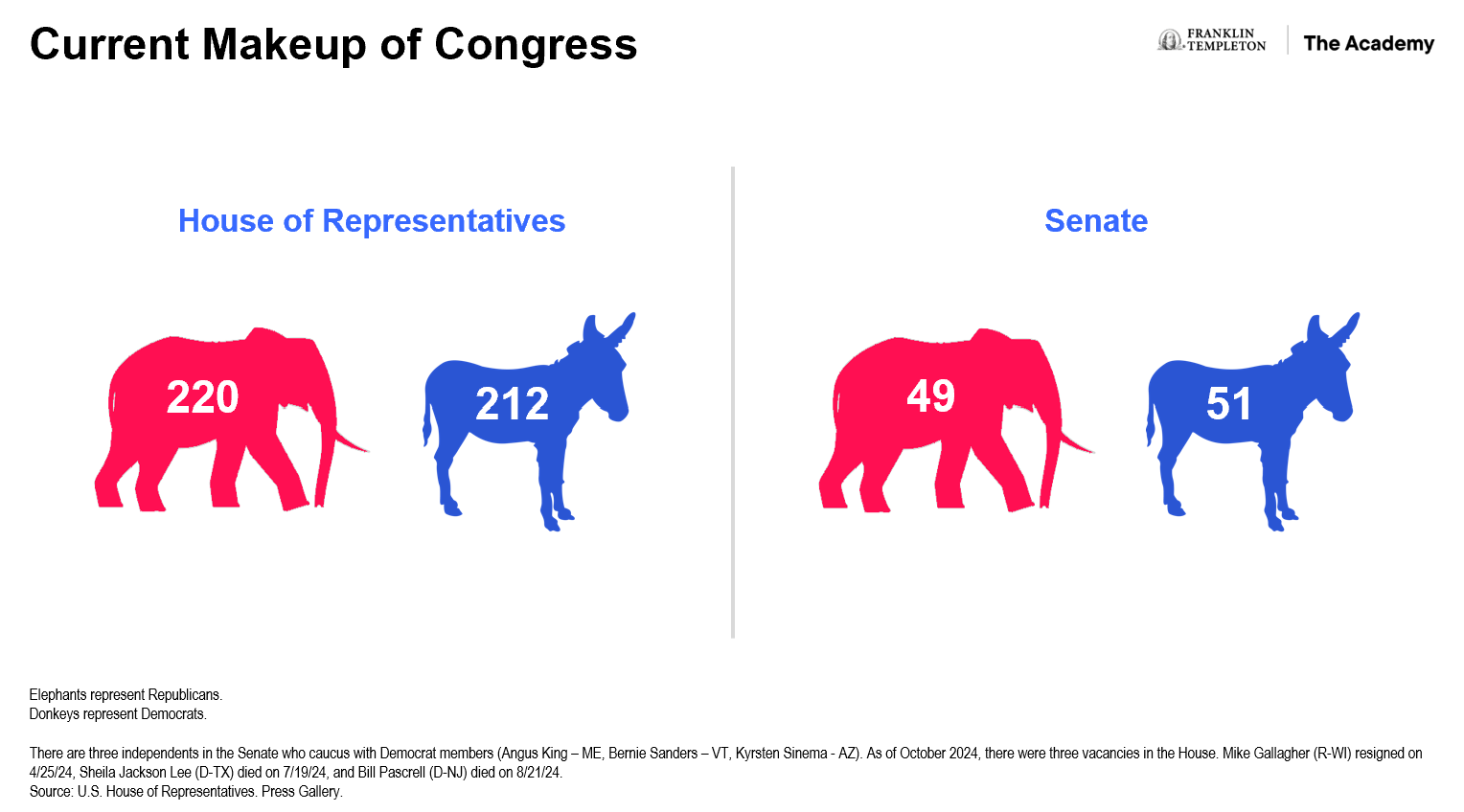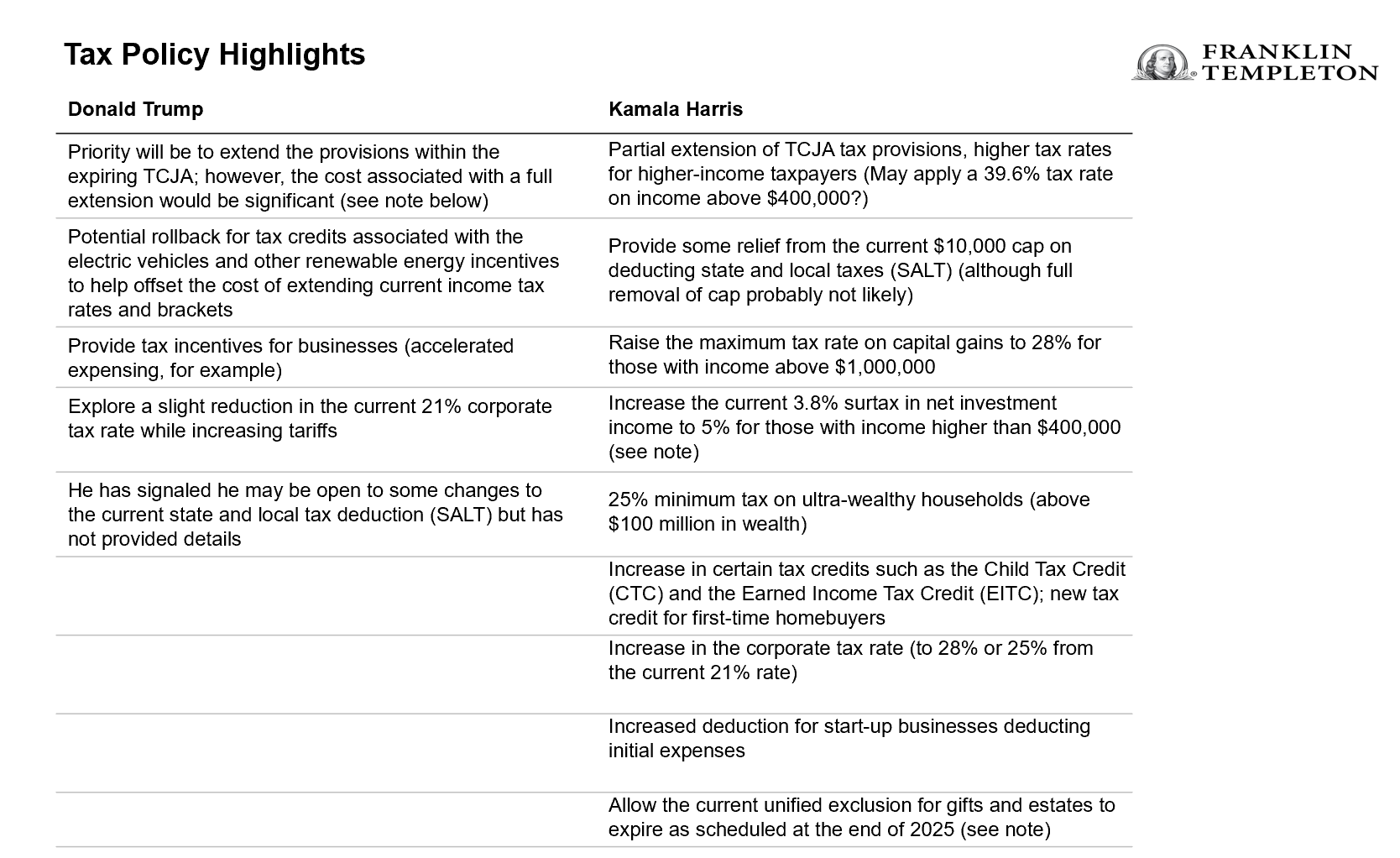As we enter the weeks leading up the election, the future of tax policy is certainly one of the hot topics being discussed on the campaign trail. Considering the pending expiration of the Tax Cuts and Jobs Act (TCJA), there will be a sense of urgency post-election for lawmakers to debate the future of taxes on individuals as well as businesses.
Here are some thoughts on tax policy as we head toward election day.
- While we may see a change in party control in the House and Senate, the slim majorities in Congress we see now are likely to remain after the 2024 ballots are counted, barring any major trend changes in the remaining few weeks before the election. This will make it challenging for whoever is in the White House to pursue more aggressive tax changes since a small number of lawmakers in either the House or the Senate could derail efforts on advancing tax-related legislation.
- For example, in November 2022 the Democrat-controlled House narrowly passed the Biden administration’s “Build Back Better Act,” which included a number of tax increases. However, the legislation stalled in the Senate even though the Democrats held a (slight) majority. Certain tax proposals being floated currently, such as taxing unrealized capital gains for some taxpayers, would likely be difficult to advance in this political environment.

• There have been several tax-related proposals floated by both presidential candidates on the campaign trail that, in our view, are highly unlikely to gain traction. For example, removing taxes on servers’ tips or not taxing Social Security benefits. In the case of Social Security, given the program’s structural solvency issues, it’s more likely that we will see increased taxes on Social Security at some point in the future.
How candidates differ on tax issues
While many details are lacking, here’s a high-level look at some tax policy changes each candidate might pursue once in office.
(Right click to view/enlarge image in new window)

Notes: The Congressional Budget Office (CBO) estimates that the 10-year cost of extending the TCJA tax provisions will cost more than $4 trillion.
The 3.8% net investment income surtax applies to taxpayers with modified adjusted gross income higher than $200,000 ($250,000 for married couples filing a joint tax return)
For 2024, the lifetime exclusion for gifts and estates is $13,610,000. If this provision expires, the figure would decline to approximately $7 million beginning in 2026.
There is no assurance that any estimate, forecast or projection will be realized.
The future of taxes?
Regardless of how tax policy evolves following the election, certain taxpayers will want to prepare for higher taxes in the future, even if we see some short-term extension of the TCJA. Rising federal budget deficits, increasing interest costs of servicing the debt, and program solvency issues associated with Social Security and Medicare will create pressure on lawmakers to increase revenue. Currently, over 85% of federal government revenue is generated by income and payroll taxes on individuals and non-corporate businesses. In fact, corporate taxes only account for approximately 10% of federal government revenue.1 A plan to increase revenue would likely have a higher proportional impact on individual taxpayers and small businesses. Individuals will want to consult with a financial advisor and tax professional on potential strategies that may help hedge the risk of higher taxes in the future.
WHAT ARE THE RISKS?
All investments involve risks, including possible loss of principal.
Any information, statement or opinion set forth herein is general in nature, is not directed to or based on the financial situation or needs of any particular investor, and does not constitute, and should not be construed as, investment advice, forecast of future events, a guarantee of future results, or a recommendation with respect to any particular security or investment strategy or type of retirement account. Investors seeking financial advice regarding the appropriateness of investing in any securities or investment strategies should consult their financial professional.
Franklin Templeton, its affiliated companies, and its employees are not in the business of providing tax or legal advice to taxpayers. These materials and any tax-related statements are not intended or written to be used, and cannot be used or relied upon, by any such taxpayer for the purpose of avoiding tax penalties or complying with any applicable tax laws or regulations. Tax-related statements, if any, may have been written in connection with the “promotion or marketing” of the transaction(s) or matter(s) addressed by these materials, to the extent allowed by applicable law. Any such taxpayer should seek advice based on the taxpayer’s particular circumstances from an independent tax advisor.
IMPORTANT LEGAL INFORMATION
This material is intended to be of general interest only and should not be construed as individual investment advice or a recommendation or solicitation to buy, sell or hold any security or to adopt any investment strategy. It does not constitute legal or tax advice. This material may not be reproduced, distributed or published without prior written permission from Franklin Templeton.
The views expressed are those of the investment manager and the comments, opinions and analyses are rendered as at publication date and may change without notice. The underlying assumptions and these views are subject to change based on market and other conditions and may differ from other portfolio managers or of the firm as a whole. The information provided in this material is not intended as a complete analysis of every material fact regarding any country, region or market. There is no assurance that any prediction, projection or forecast on the economy, stock market, bond market or the economic trends of the markets will be realized. The value of investments and the income from them can go down as well as up and you may not get back the full amount that you invested. Past performance is not necessarily indicative nor a guarantee of future performance. All investments involve risks, including possible loss of principal.
Any research and analysis contained in this material has been procured by Franklin Templeton for its own purposes and may be acted upon in that connection and, as such, is provided to you incidentally. Data from third party sources may have been used in the preparation of this material and Franklin Templeton (“FT”) has not independently verified, validated or audited such data. Although information has been obtained from sources that Franklin Templeton believes to be reliable, no guarantee can be given as to its accuracy and such information may be incomplete or condensed and may be subject to change at any time without notice. The mention of any individual securities should neither constitute nor be construed as a recommendation to purchase, hold or sell any securities, and the information provided regarding such individual securities (if any) is not a sufficient basis upon which to make an investment decision. FT accepts no liability whatsoever for any loss arising from use of this information and reliance upon the comments, opinions and analyses in the material is at the sole discretion of the user.
Products, services and information may not be available in all jurisdictions and are offered outside the U.S. by other FT affiliates and/or their distributors as local laws and regulation permits. Please consult your own financial professional or Franklin Templeton institutional contact for further information on availability of products and services in your jurisdiction.
Issued in the U.S. by Franklin Distributors, LLC, One Franklin Parkway, San Mateo, California 94403-1906, (800) DIAL BEN/342-5236, franklintempleton.com – Franklin Distributors, LLC, member FINRA/SIPC, is the principal distributor of Franklin Templeton U.S. registered products, which are not FDIC insured; may lose value; and are not bank guaranteed and are available only in jurisdictions where an offer or solicitation of such products is permitted under applicable laws and regulation.
Please visit www.franklinresources.com to be directed to your local Franklin Templeton website.
_________________________________
1. Source: “The Budget and Economic Outlook 2024-2034.” Congressional Budget Office (CBO). As of February 2024.

